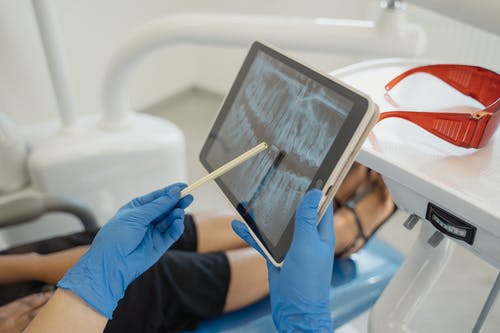Many individuals experience dental anxiety due to a variety of reasons. It can stem from negative experiences in the past, fear of pain or magnified pain perception, feelings of helplessness, or embarrassment over oral health status. The fear can be so intense that it leads people to avoid dental check-ups and treatments, leading to more severe and costly oral health conditions.
What Is Sedation Dentistry?
Sedation dentistry is a medical practice that involves administering sedative drugs, usually through inhalation, oral consumption, intravenous methods, or even general anesthesia. The procedure aims to relax and calm the patient during dental procedures, ranging from basic tooth cleaning to more invasive methods. One of the key benefits of sedation dentistry services is its potential to reduce or even eliminate dental anxiety significantly.
How Does Sedation Dentistry Work?
Sedation dentistry employs pharmaceutical methods to induce a state of calm in patients before and during a dental procedure. These sedatives vary in strength and can be used for minor procedures or complex operations. The sedatives induce relaxation; sometimes, the patient may not even remember undergoing dental treatment.
Types of Dental Sedation
Depending on the level of anxiety and the complexity of the dental procedure, different types of sedation can be used:
- Nitrous Oxide: Also known as laughing gas, this is often used for simple procedures and mild anxiety cases.
- Oral Sedation: The patient takes a prescribed pill before the procedure, reducing anxiety levels.
- IV Sedation: Sedatives are administered directly into the bloodstream, allowing the dentist to adjust the level of sedation continuously.
- General Anaesthesia: the patient is fully unconscious. Usually reserved for long, complex procedures or severe dental phobia cases.
Sedation Dentistry and How It Relieves Dental Anxiety
Sedation dentistry can provide dental anxiety relief through
1. Relaxation
Sedation dentistry induces a state of deep relaxation, both physically and mentally. This relaxation response helps calm your nerves, reduce muscle tension, and promote a sense of tranquility. As your body and mind relax, the typical anxiety and stress associated with dental visits begin to fade.
2. Reduced Anxiety
For individuals with dental phobia or high anxiety levels, even the thought of a dental appointment can trigger intense fear. Sedation dentistry suppresses these anxieties, allowing you to approach the dental procedure more calmly and composedly.
3. Pain Management
One of the major sources of dental anxiety is the fear of pain during dental treatments. Sedation dentistry can include pain-relieving properties, reducing or eliminating the discomfort you might feel during the procedure. This particularly benefits individuals with heightened pain sensitivity or past traumatic dental experiences.
4. Enhanced Cooperation
Patients who experience difficulty sitting still or cooperating during dental treatments due to anxiety or restlessness can benefit from sedation. Sedation helps you remain still and cooperative throughout the procedure, ensuring it is performed efficiently and safely by inducing a state of relaxation.
5. Memory Suppression
Some sedation methods can result in temporary amnesia, meaning you won’t remember much or anything about the procedure. This can be a tremendous relief for individuals who fear the details of dental treatments and find the anticipation of the experience distressing.
6. Time Perception Alteration
Sedation can alter your perception of time, making the procedure feel shorter than it is. This can be advantageous for patients who tend to feel anxious during prolonged treatments, as the perception of time passing quickly can contribute to a more relaxed experience.
7. Increased Threshold for Discomfort
Sedation can raise your pain threshold, making you less sensitive to discomfort or pain. This is particularly valuable during procedures that might otherwise cause discomfort, helping you remain comfortable and calm throughout the treatment.
8. Positive Experience Reinforcement
Successful dental experiences under sedation can create positive associations with dental care, gradually reducing dental anxiety. This positive reinforcement can contribute to improved oral health habits and more regular dental visits.
9. Appropriate for Various Procedures
Sedation dentistry is versatile and can be tailored to various procedures, from routine cleanings to complex surgeries. Knowing you can receive necessary treatments under sedation can make scheduling and undergoing dental procedures easier without excessive anxiety.
Remember that effective communication with your dentist is essential. They will work with you to determine the most suitable level of sedation based on your anxiety level, medical history, and the specific procedure. With the right approach, sedation dentistry can transform your dental experience from fear and anxiety to comfort and calmness.
How About in Emergencies?
An emergency dentist is crucial in severe toothache, knocked-out teeth, or other serious dental complications that need immediate attention. These professionals can provide immediate treatment to relieve pain and save a tooth. Emergency dental clinics also offer sedation dentistry to manage pain and anxiety during urgent procedures.
Family Dentistry and Sedation
A family dentist plays a vital role in maintaining the oral health of all family members, including children, who may often express fears and anxieties about dental visits. Using sedation techniques, an affordable family dentist can ensure patients’ comfort, regardless of age or anxiety level, and thus reinforce positive dental experiences early on.
Is Sedation Dentistry Right For You?
While sedation dentistry can benefit many individuals suffering from dental anxiety, it may not suit everyone. Factors like the patient’s health history, current medications, and the dental procedure’s complexity must be considered. It’s always advisable to discuss with your dentist about your concerns and explore the best options tailored for you.
Conclusion
Dental anxiety should not hinder receiving essential oral health care. The development and application of sedation dentistry have been pivotal in managing this obstacle. Sedation dentistry represents a practical solution and a significant step towards optimizing oral health and well-being by inducing a relaxed state, reducing pain and discomfort, and forming positive dental experiences.




